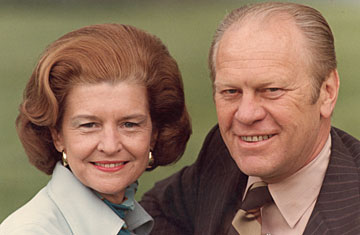
Betty Ford and her husband, President Gerald Ford, are shown in a 1976 photo. The former First Lady, who brought her struggles with alcoholism and breast cancer into the public spotlight, died July 8, 2011, at 93
(4 of 4)
Her tenure as First Lady was in a way therapeutic. It gave her a direction and focus, so maybe it wasn't surprising that, like many presidential spouses, she felt a sense of anticlimax after she and Gerald left office and settled into an early retirement in a nice house in Rancho Mirage, Calif.
In April 1978, her daughter Susan arranged an intervention, with the whole family and some Navy doctors present. There was no suitable rehab clinic for her in those days; she entered the Long Beach Naval Hospital in California for alcohol and drug treatment. There was no hiding this crisis either: she didn't want people to think her cancer had returned. "It's an insidious thing, and I mean to rid myself of its damaging effects," she said of her multiple addictions. "There have been too many other things that I have overcome to be forever burdened with this." Four years later, with the help of tire magnate Leonard Firestone, she cut the ribbon on the 60-bed facility in Rancho Mirage that bore her name, after a last-minute run to Kmart for soap and shower curtains.
And so her very name became synonymous with intensive, serious rehab treatment for a disease that can hit anyone — a disease, she explained, not loose morals or lack of willpower.
She was worried about naming the facility the Betty Ford Clinic — not because of the notion of stigma being forever attached to her name, but because of her fear that she might slip and fail to live up to the example she wanted to set. "I liked alcohol, it made me feel warm," she wrote in her 1987 memoir Betty: A Glad Awakening. "And I loved pills, they took away my tension and my pain. So the thing I have to know is that I haven't got this problem licked; to my dying day, I'll be recovering."
She was no figurehead: she ran the center, served on the board and greeted support groups at the center by saying "Hi, my name is Betty, and I'm an alcoholic." She walked the grounds, straightened the pictures, worked the budget. Sometimes, especially when an older woman would check in warily or resentfully, counselors would call her at home and she would go to the center, sit in their room, hold their hand and talk.
The center kept her busy, while her long marriage helped keep her happy. In their later years, she and Jerry ate dinner on trays while watching Jeopardy!, or played gin rather than drinking it. When he died in 2006, the world remembered how strong and tiny she was, standing with her children around her as the nation laid her husband to rest.
Betty Ford wrote that she was sometimes asked if she was on a mission. She said no, that would be presumptuous. "I don't think God looked down and said, 'Here's Betty Bloomer, we're going to use her to sober up alcoholics.' But I do think people relate to someone who has the same problems they have, and who overcomes them. And I think God has allowed me — along with thousands of others — to carry a message ... there's help out there, and you too can be a survivor. Look at us. Look at me."
